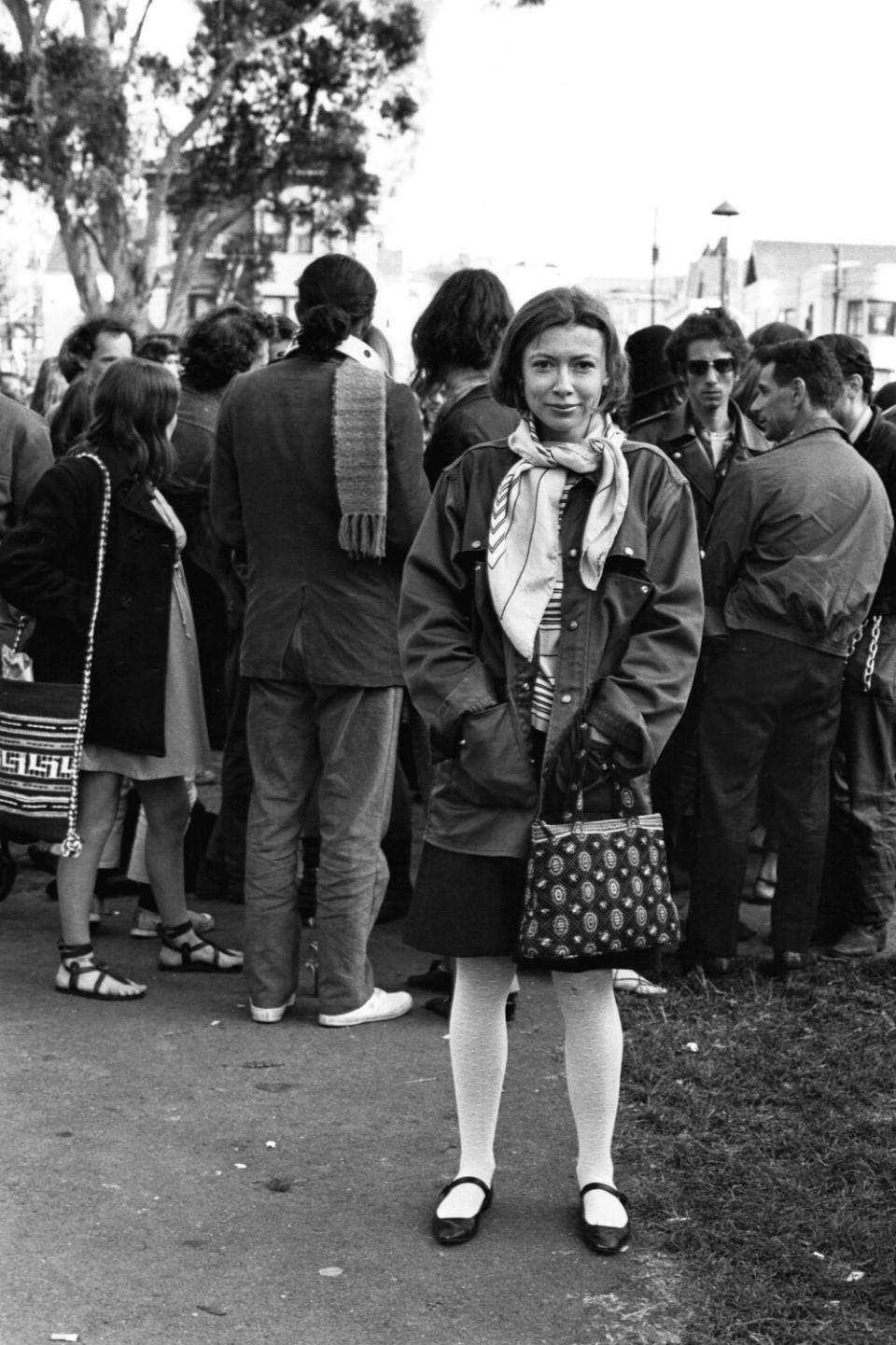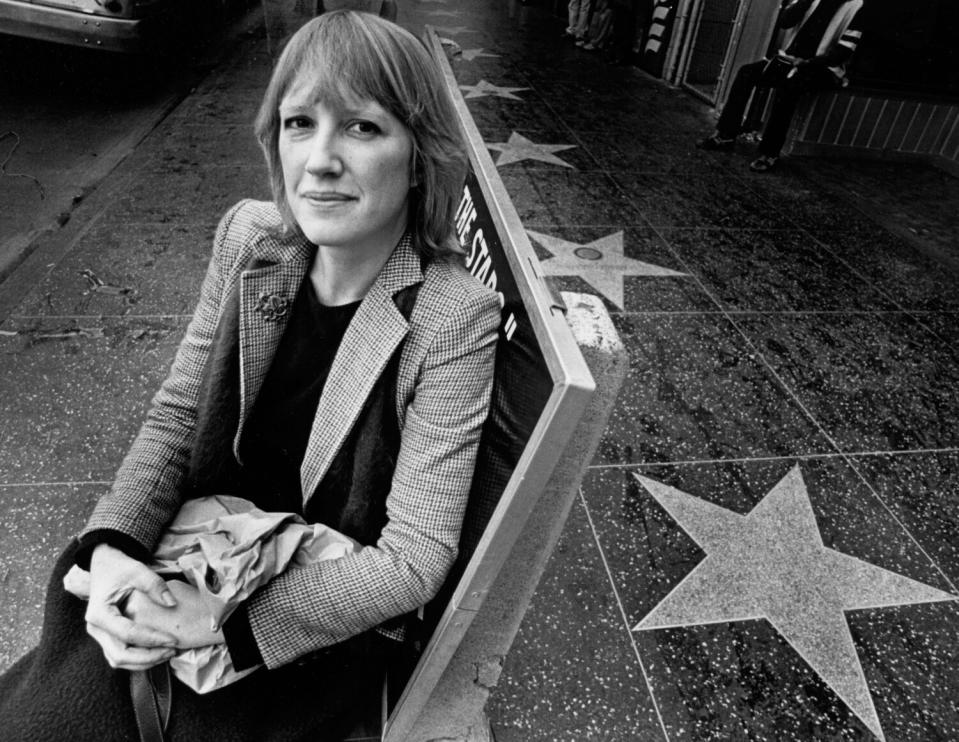The Doors' John Densmore remembers Joan Didion, Eve Babitz and Jim Morrison

- Oops!Something went wrong.Please try again later.
- Oops!Something went wrong.Please try again later.
“We tell ourselves stories in order to live,” Joan Didion famously wrote to open “The White Album,” her kaleidoscopic essay on Los Angeles in the late 1960s and early ’70s that effortlessly flows through topics including Jim Morrison, Sharon Tate, Huey Newton, Didion's stint in a psych ward, the Manson murders, living in a Franklin Avenue home in "a senseless-murder district" and that time "Roman Polanski accidentally spilled a glass of red wine" on her in Bel-Air.
Named for the Beatles' self-titled album, Didion’s essay, which she worked on for a decade and published in her 1979 book of the same name, rings with an imaginary soundtrack.
Of her time living in Hollywood in her Franklin Avenue home, she writes: “I remember walking barefoot all day on the worn hardwood floors of that house and I remember ‘Do You Wanna Dance’ on the record player, ‘Do You Wanna Dance,’ and ‘Visions of Johanna’ and a song called ‘Midnight Confessions.'"
Most famously, Didion devoted a major scene to her experience watching the Doors in the studio working on “Waiting for the Sun,” their 1968 album featuring classics including “Hello, I Love You” and “The Unknown Soldier.” She describes “sitting on a cold vinyl floor” at Sunset Sound on Sunset Boulevard with Doors members Robby Krieger, Ray Manzarek and John Densmore. They’re waiting for Morrison to arrive, and when he does, he’s his predictably provocative self, seemingly performing for Didion.
Didion: “He lights a match. He studies the flame awhile and then very slowly, very deliberately, lowers it to the fly of his black vinyl pants. Manzarek watches him. The girl who is rubbing Manzarek’s shoulders does not look at anyone. There is a sense that no one is going to leave this room, ever.”

Drummer Densmore was in that room and watched that interaction, he says during a phone call to discuss being included in Didion's writing. But he’s also got something else on his mind.
“It’s pretty synchronistic that you’re calling because I was just writing a little letter to the editor about Eve Babitz,” he says.
Babitz, who died on Dec. 17, was celebrated for writing about Los Angeles culture during roughly the same period. But unlike Didion, who was an outsider to the rock and club scene, Babitz was an art and music insider — she had a fling with Morrison — and her writing reflected it.
Wrote Babitz of the Doors singer: “He was so cute that no woman was safe. He was 22, a few months younger than I. He had the freshness and humility of someone who’d been fat all his life, and was now suddenly a morning glory. I met Jim and propositioned him in three minutes …”
To extend Didion’s thought on stories and life, we multiply our lives when our stories collide. Below, Densmore discusses his intersections with both Didion and Babitz. The conversation has been edited for length and clarity.
Why were you writing a letter to the editor?
I was reading the story about Eve and the art world, and with all the tributes to Eve, no one has mentioned Eve doing the collage for Buffalo Springfield's album cover — which I remember her spreading out on the desk of the Doors’ manager — started a movement, in my opinion.
Where did this happen?
It was in the Doors' office [in West Hollywood]. She was in and out. At the time, I was not into writing as much as Jim, obviously. I was in the music, which could match Jim's lyrics, but it was years later when I realized how brilliant Eve and Joan were. In “The White Album,” Joan describes coming to the studio and hearing us record. At the time, I had no idea that “Slouching Towards Bethlehem” was a reference from a Yeats poem.
What do you remember about Joan’s presence in the studio?
In my autobiography, I described her as “a mousy little writer [who] was standing in the corner of the control room being very quiet.” I didn't pay much attention to her. She was just sort of lurking. There's the famous thing of Jim lighting a match for his cigarette or joint and he realizes Joan is looking at him, and he lowers the match down to his crotch.

Maybe you can settle an argument that’s occurring online. Throughout “The White Album,” Didion describes Morrison as wearing vinyl pants. Many people, most notably Rachel Kushner, believe she’s wrong — that he was wearing leather pants. Those weren’t vinyl pants, were they?
[Laughs.] No, the pants were leather. I used to make jokes about them because he wore them for weeks. I said, “Jim, do you just stand them up on the corner when you take them off?” Later, he got a lizard-skin suit. That's when I thought, "He's buying into his own myth."
What do you recall about Babitz?
Well, she evolved into writing these sentences that were jam-packed with local ambiance and more universal questions all in one sentence. Like, wow, maybe even beyond Joan — not that they're in competition. They're two great L.A. writers. What did Eve say? “I'm not Joan Didion,” and she isn't. She is different — and was maybe a little jealous of Joan’s success.
Had you kept in touch with Eve?
Not in many, many years. How should I say this? I was a stepping-stone. She was after Jim. Look who she went through: Ed Ruscha, Steve Martin, et cetera.
Wait, did you have an affair with Eve?
Yes, but it was clear that she was interested in Jim. I mean, you’ve gotta love her for her artistic pursuits. I remember years ago, one producer, I think Lou Adler, said of the Doors movie, “Eve Babitz should write that script.”
[Note: Not long after this interview occurred, Densmore followed up with an email regarding his time with Babitz: "Randall, 'affair' is too strong of a word. I was a 'one-night stand' on the way to the Lizard King ... is more like it."]
This story originally appeared in Los Angeles Times.

